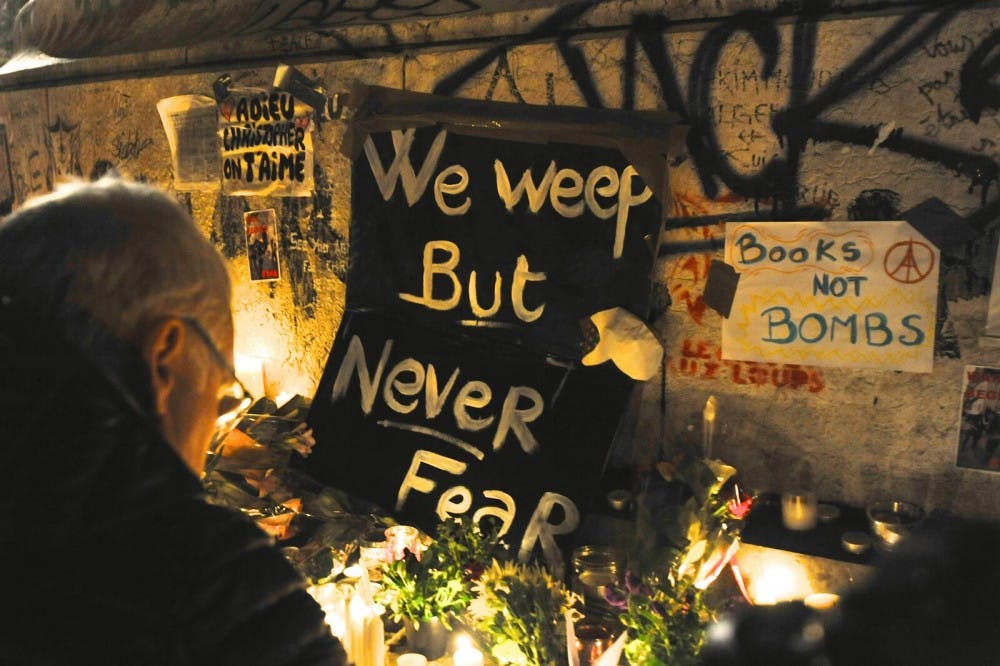Ayan Aidid was meandering through the streets of Prague after dinner with friends. Luis Ferre Sadurni was in a Spanish bar in Paris. Gabriela Vidal-Irizarry was having dinner with her aunt. Peter Herbst was on his way home from a day of solitary museum visits. Hannah Fagin was making her way to her friend’s apartment. I was in the middle of an interview in a cramped AirBnB in Brussels.
But for all of us, at that moment, the world stood still.
Last Friday, at approximately 9:30 p.m., the city of Paris experienced the largest terrorist attack in its history. The series of coordinated shootings and bombings throughout the city, which unfolded over the course of several hours, left 129 people dead and hundreds more wounded.
The next day, ISIS claimed responsibility for the attacks. Seven of the attackers died at the scenes of the attacks on Friday, including multiple natural-born French citizens and at least one Syrian who entered France posing as a refugee. Also on Saturday, several people were arrested in Belgium in relation to the attacks. Since the attacks, French police have conducted more than 150 raids throughout Paris, and on Tuesday, five people were arrested in Germany.
The attacks captured international attention. In the following days, countries around the world lit their buildings in the colors of the French flag, and the attacks featured prominently in most news cycles internationally.
For all of us, though, the attack was more than just a headline. We are all College juniors and, for the past three months, Paris has been our home. As study abroad students based in Paris, we all experienced the night of the attacks in real time.
Almost universally, students remember initial reactions of shock and confusion.
Fagin was trying to meet up with friends and intended to transfer at the metro station Republique, which was at the center of the shootings. When the conductor announced that the train would not stop at Republique, Fagin said she didn’t think much of it and got off the train to find another way to the station. She said she remained unfazed when the entire metro station was evacuated and only realized something had happened when she made it to her friend’s apartment and saw the news.
“When I finally got to my friend’s, she was panicked but shocked that I was so calm. I had no idea what had happened until she told me,” Fagin said. “My first reaction was confusion, but as soon as we got inside and turned on CNN, it turned to terror.”
Sadurni remembers a similar experience. Out with friends at a Spanish bar in the second arrondissement of Paris, he got a text from a friend asking if he was safe.
At first, Sadurni said, he brushed off the news as “just another shooting” and didn’t think much of it. “I just assumed that it was something that happened far away from me and that it probably [would] be handled soon,” he said. “We’re all kind of numb to things like threats and shootings,” he added, saying that he didn’t realize until later the magnitude of the events.
Vidal-Irizarry didn’t realize what was happening until she was in the middle of it. She had just finished having dinner with her aunt just two streets from where the street shootings happened when she decided to venture out to meet friends in the Montparnasse area of Paris. She estimated that it was about 10 p.m. when she left.
“I started to walk down the street and all of a sudden there was just this huge crowd of people all running away and screaming and crying,” she said. “It was a real fight or flight moment. My only instinct was just to run.”
It took Vidal-Irizarry 45 minutes to find a cab and make her way to her friend’s apartment, where she finally turned on the news to see what happened. “It just kept coming in waves. Every few minutes things just got worse,” she remembered.
Students who were outside the city for the weekend had a different experience.
Aidid, who was with other Penn students in Prague, said her primary feeling in the immediate wake of the attacks was fear that she wouldn’t be able to return to Paris.
Shortly after initial reports of the attacks, French President Hollande announced that all French borders would be closed. His announcement was later clarified to say that borders would be strictly patrolled, but would remain open. No Penn students based in Paris who were out of the country had trouble returning to the city at the end of the weekend.
Aidid said that the attacks tainted the rest of her trip to Prague. “Everything felt very dragged out. It felt so wrong to get up and go do touristy things knowing that people back in Paris had just experienced so much tragedy.”
In Belgium, I was in my rented room for the night with five other students from my study abroad program when we heard the news. After a feeble attempt to go out and enjoy the night in Brussels for what couldn’t have been more than an hour, we huddled together around computer screens, holding each other just a little tighter with each new piece of information or increase of the death toll. The rest of the weekend consisted of subdued visits to churches and a continuous dialogue of shock and sadness.
Once the initial shock of the reports wore off, students expressed wide ranges of emotion.
Vidal-Irizarry, who has spent every summer in Paris since she was 10 years old, felt very emotionally connected to the city. “This city is so powerful — even as a foreigner, it has such a powerful draw to it. When it is attacked, you want to defend it — it feels personal,” she said.
Herbst agreed. “For me, Paris will not just be a place I lived for four months. It’s a place I am more personally attached to than that,” he said. “Going through this has made it a very special place for me. I really feel like I have a stronger connection here that goes beyond just going to museums or class. It’s an intangible connection,” he said.
Aidid said that through her initial feelings of shock and sadness, she has felt anger. “When I’m walking around the city, usually I like to listen to music — those are some of my favorite moments of being in Paris. I had this moment the other day when I was walking home and I realized that I probably shouldn’t be listening to music — that I do live here and that I need to be vigilant,” she said. “And then I just got really angry. These guys have ruined my walks for me. I used to be so comfortable walking around with headphones in, but now I feel like I can’t because I have to be on high alert.”
All of the students also noted how quickly life has seemingly moved on in Paris.
“I went out for a run on Sunday, and it was a beautiful day, and people were out reading and picnicking and running, just like any other day,” Herbst said. “For me, it was really reassuring to see that — to see that, despite everything, people were doing their best to return to their normal lives. Personally, I think that’s the best form of self-protest.”
Fagin agreed. “I live with a host family, and they have really encouraged me to continue to live my normal life and not be afraid to go to museums and use the Metro and things like that,” she said. “La vie continue,” she added.
Vidal-Irizarry expressed a similar sentiment, saying that it has reinforced for her the resilience of the city.
“We all only have this one life. Things like your morning croissant — that is all we have. The strength of Paris is that, despite everything, people move on, and they still have their morning croissant,” she said.
But despite the city moving on, students said people are still visibly hurting.
“Paris is not the same. You can see the trauma written all over people’s faces,” Vidal-Irizarry said. “Once you live through something like this, the fear is so tangible — nobody can take that feeling away from you.”









